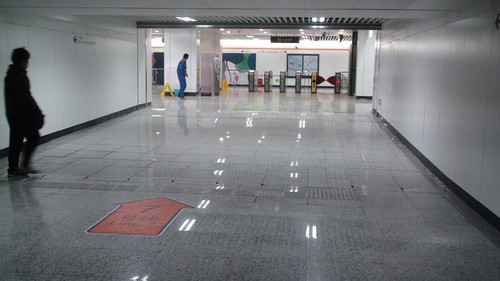Metro Line #7 finally opens yesterday on December 5, 2009, at 9:00 AM. I took this afternoon taking the Metro Line #7 and took some photos.
Overview of the Metro Line #7
Shanghai Metro Line #7 is an orange line – the color of this line. It goes from Meilanhu on the northwest of the city to Huamu Road on the southeast. The completed line #7 will have 33 stations, but currently, only the stations between (including) Shanghai University and Huamu Road are open.
Here is a list of the stations of this metro line:
- Meilan Lake
- Luonan Xincun
- Panguang Road
- Liuhang
- Gucun Park
- Qihua Road
- Shanghai University
- Nanchen Road
- Shangda Road
- Changzhong Road
- Dachang Town
- Xingzhi Road
- Dahuasan Road
- Xincun Road
- Langao Road
- Zhenping Road
- Changshou Road
- Changping Road
- Jing’an Temple
- Changshu Road
- Zhaojiabang Road
- Dong’an Road
- Chuanchang Road
- Houtan
- Changqing Road
- Yaohua Road
- Yuntai Road
- West Gaoke Road
- South Yanggao Road
- Jinxiu Road
- Fanghua Road
- Longyang Road
- Huamu Road
The importance of this line is, that it connects many lines together. It can interchange to line #1 at Changshu Road, to Line #2 at Jing’an Temple and Longyang Road, and Line #3/#4 at Zhenping Road, Line #9 at Zhaojiabang Road, and many other lines in the future.
Photos of the Shanghai Metro Line #7
Below: This is the orange cart of the orange line.

Below: the problem with Line #7 is, it is still not very easy to transit between lines. Although it is not as bad as Metro Line #1 and #2 at the People’s Square Station, it cannot be called close. These three photos shows the transition tunnel and the elevator between Metro Line #2 and Metro Line #7 at Long Yang Road Station. I won’t complain about the distance, but won’t be happy about it either.



Construction is still going out outside the station to have the final work finished.

Below: The colorful seat with green designates the seat for disabled.


Good thing is, the Line #7 is completely equipped with glass walls.

Huamu Road Station, the terminal station of Line #7 is the gate to the Shanghai International Expo Center. It has the best station design I saw along Metro Line #7 so far. It has the two levels connected with a big courtyard in the middle. All the other stations are, hmmm, just stations.


Look at this amazing Shanghai Metro Map. For a city with just 15 years of Metro history, this is very quick.

The Metro Line #7 is equipped with restrooms. Yeah!

There are more equipments than other lines. Look at this. They even have two vendor machine inside the paid zone of the station, so people can help themselves to make up the shortage of ticket if they didn’t buy enough value.

The service center is also more modern than other lines.

People are Excited
With just one line running from Hongmei Road to Shanghai Railway Station, I can remember the name of each station and their exact order. I can even tell the station from the decoration – the color and seats in the waiting area when I just came to Shanghai. Now, about 100 stations are there, and I can hardly been to half of them, and even cannot remember all of them.
Before, there was just one transit station – People’s Square, and later, with the network of Metro System extends, there are more and more transit stations, and now, it seems there are less stations which are not transit stations in the urban area of Shanghai than those are not.
I brought Yifan to the system today. He is so excited. Besides the metro staff who are there on duty, Yifan is always another person who wait until the train went out of sight before moving an inch. For two days, Yifan fall asleep on metro trains. He just don’t want to leave the subway system – just like his father.







